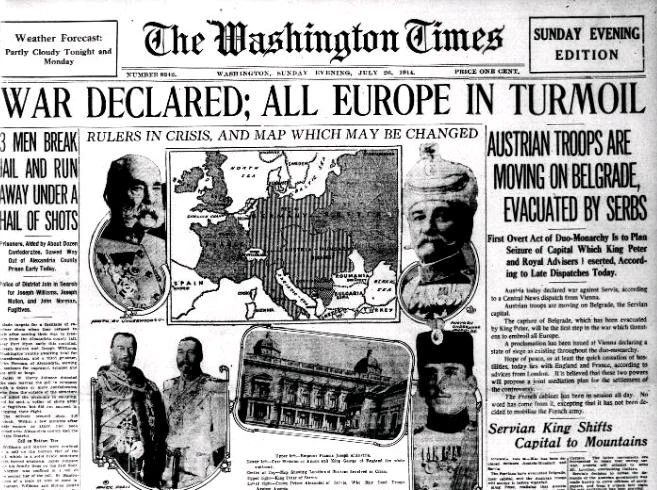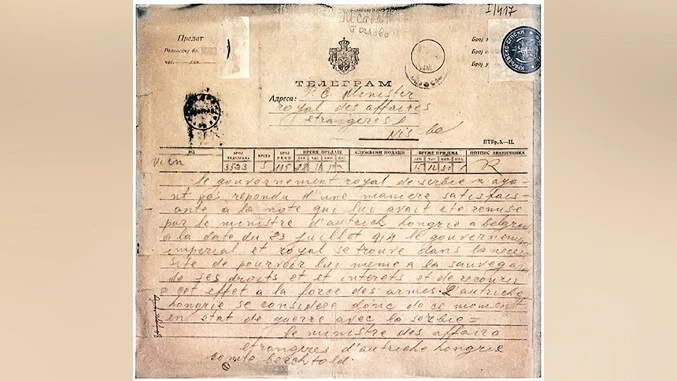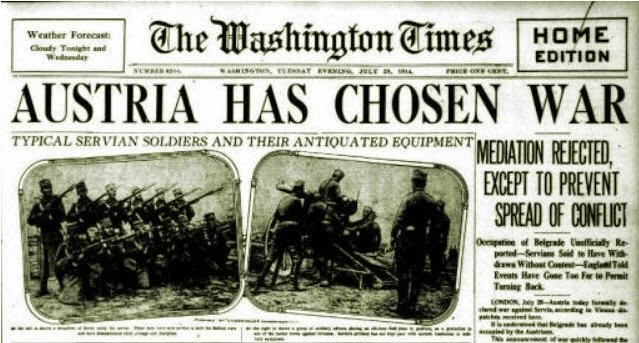Commemorating 110 years from Austria-Hungary's Declaration of War on Serbia: A Turning Point in History

Today marks 110 years from July 28, 1914, a date that irrevocably changed the course of history. On this day, Austria-Hungary declared war on Serbia, setting off a chain of events that would lead to the outbreak of World War I. This blog delves into the events leading up to this declaration, its immediate aftermath, and the lasting impact it had on Serbia and the world.
Prelude to War
The spark that ignited World War I was the assassination of Archduke Franz Ferdinand of Austria-Hungary in Sarajevo on June 28, 1914. Gavrilo Princip, a Bosnian Yugoslav nationalist, carried out the assassination, which set off a series of political maneuvers and military preparations. Europe, already a tinderbox of alliances and rivalries, was pushed into conflict by this final sparcle.
The Declaration of War
In the wake of the assassination, Austria-Hungary issued an ultimatum to Serbia with demands that were factically impossible to meet. Despite Serbia's attempts to comply with most of the demands, Austria-Hungary declared war on July 28, 1914. This act marked the beginning of a global conflict that would last over four years and involve many of the world's great powers.
Immediate Aftermath
The declaration of war led to rapid mobilization on both sides. Early battles between Austria-Hungary and Serbia were fierce and set the tone for the brutal conflict that would follow. Serbia, despite being significantly outmatched in resources and manpower, demonstrated remarkable resilience and determination, earning admiration and respect worldwide.
The Wider Impact on World War I
The war declaration by Austria-Hungary against Serbia acted as a domino, triggering alliances and entanglements that brought more nations into the conflict. Key battles and turning points, such as the Battle of the Marne, the Battle of Verdun, Kolubar and Cer Battle, were direct consequences of this initial declaration, shaping the course of World War I.
Historical Significance
The legacy of this conflict is profound. For Serbia, it meant immense loss and hardship (1.1 to 1.3 mio.people) , but also a fierce resistance that became a symbol of national pride. For Austria-Hungary, the war led to the eventual dissolution of the empire. The global repercussions were far-reaching, reshaping national boundaries and political landscapes worldwide.
Commemorating the Anniversary
Today, the events of 1914 are commemorated through various memorials and educational initiatives. In Serbia, war memorials and museums offer insights into the country's role in World War I. Globally, historians and educators use this anniversary to reflect on the lessons learned from the conflict and its enduring impact on modern society.
Conclusion
As we remember 110 days from the day Austria-Hungary declared war on Serbia, it's crucial to reflect on the historical significance of this event. By understanding the past, we can better appreciate the complexities of international relations and the importance of striving for peace. Explore more about World War I through books, documentaries, and memorials, and join in commemorating this pivotal moment in history.
Picture source: Wikipedia
Related products
Read also
Who was Saint Sava and what was his contribution?
"Saint Sava: A Beloved Serbian Saint with a Rich Legacy and Cultural Significance"
…Serbian New Year: Tradition, Customs and How to Celebrate it
The Serbian New Year, also known as the Orthodox New Year, is celebrated on…
Gifts Inspired by Serbian Culture: Authentic Ideas for the Holidays
The holidays are a time of giving, and finding the perfect gift is often a challenge.…
Traditional Serbian Christmas Customs: How to Cultivate Them in Modern Times?
Christmas is the most joyous holiday in Orthodox Christianity, a time when families…
How to Bring the Spirit of Orthodox Tradition into Your Home This Winter?
Winter is the perfect time to bring warmth, togetherness and the spirit of Orthodox…
Serbian Souvenirs: Perfect New Year's Gifts for All Tastes
New Year is the time of giving, and what is more beautiful than a gift that…
How to stay productive and not waste an entire day on Black Friday shopping
Black Friday is a day full of amazing discounts, but it can easily become exhausting…
Folk Beliefs and Customs for Saint Aranđel - Assembly of Holy Angels
Saint Michael the Archangel, who is celebrated…
Folk Beliefs and Customs for Đurđić - Glory of St. George
Đurđić, the feast of St. George, celebrated on November 16, is one of the most…
Smart shopper's guide: How to make the most of Black Friday
Black Friday is the most famous shopping event of the year that offers huge…
The history of Black Friday: How it all began and why it continues
Black Friday, known as the biggest discount day of the year, today attracts…
Gifts for Children in the Diaspora: How to Nurture the Connection with the Language, Culture and Tradition of Serbia
Children who grow up in the diaspora face specific challenges - they lose contact…

Apply for newsletter
Sign up for the Serbianshop newsletter and get a 10% discount.

















